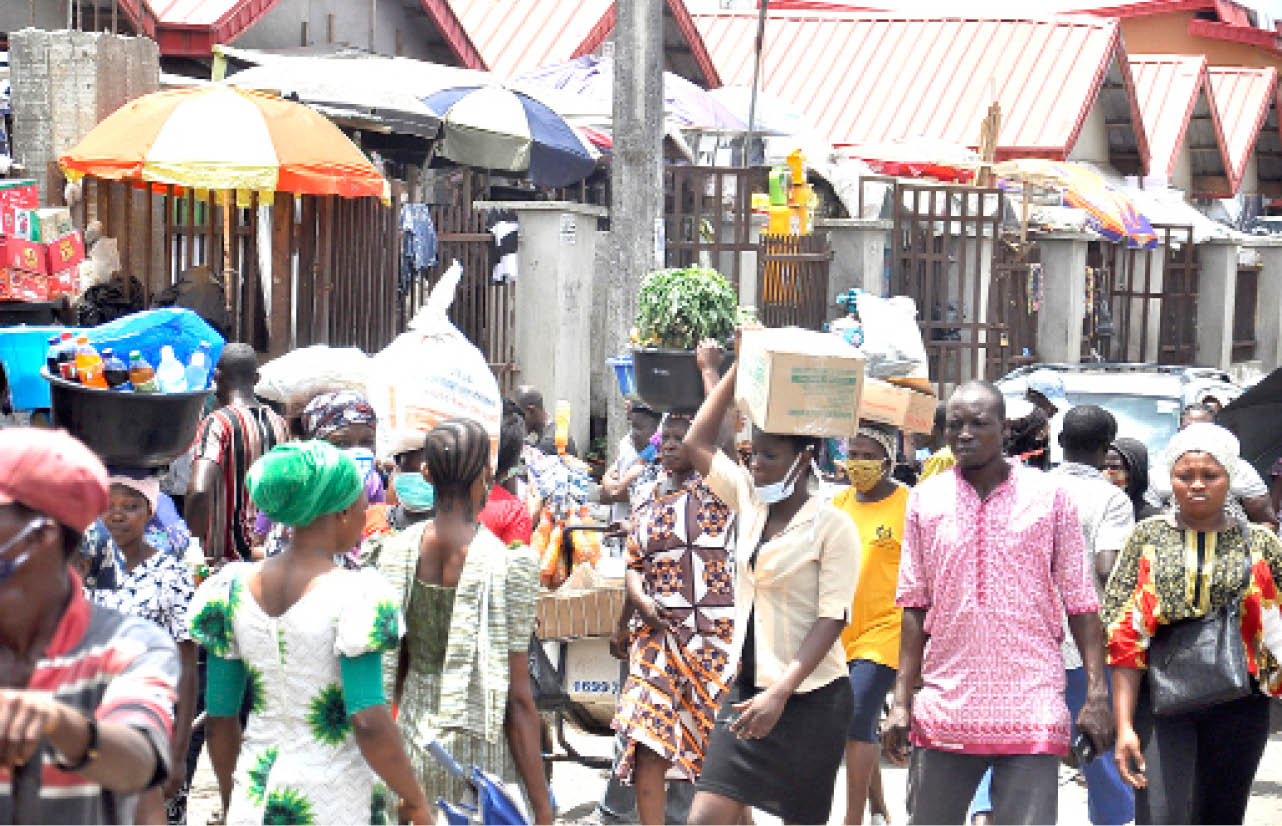Ramadan amidst lockdown: How the states fare
It is a tough experience for residents of Katsina as they cope with the lockdown while engaging in the Ramadan fast. The lockdown has compelled confinement to homes thereby forcing the closure of businesses and consequent rise in prices, which is bound to affect several lives with the commencement of the Ramadan fast in terms […]

Cross-section of Ile-Epo Market in Lagos
It is a tough experience for residents of Katsina as they cope with the lockdown while engaging in the Ramadan fast.
The lockdown has compelled confinement to homes thereby forcing the closure of businesses and consequent rise in prices, which is bound to affect several lives with the commencement of the Ramadan fast in terms of households’ feeding and charity.
Khadijat Sulaiman, commenting on the situation said, “Basic needs such as meat, staple food items, and other essential needs are hard to come by in the markets due to shortage in supply informed by the restrictions in movement. Basic items available have witnessed hike in prices. I was told the abattoir did not operate because of the existing lockdown; I was helpless and returned home sad,” she said.
A commercial motorcyclist Yusuf Ibrahim said, “The lockdown has forced us out as I can’t plan anything for the Ramadan, since I have to ferry passengers to feed my family.”
Our reporter gathered that prices of foodstuff have skyrocketed in Katsina State. A measure of beans which sells for N800 has jumped to N1,200, while a bag of rice has risen to N18,700 from N17,000. A bag of sachet water is hard to come by in the state while its price has multiplied from N60 to N120.

Mixed feelings in Kaduna
In Kaduna, while Muslims are elated over the Ramadan fasting, people are worried about feeding their families under the lockdown.
Despite the two-day window (Tuesday and Wednesday) initially granted residents to stock up food items and other essential needs, our correspondent reports that businesses have come to a halt with many residents short of cash as they depend on daily income from engagements to cater for their needs.
Hajiya Halima Ahmad, who sells kitchen items at the central market, said “My husband is a civil servant and he has not worked for over a month since they were asked to remain at home. The government said they are going to deduct 25 percent from their salaries, and I cannot take chances. That is why I decided to use the money in my possession to buy food for the family.”
Ibrahim Halilu, who is a cobbler, is worried on how to fend for his family in the Ramadan with lockdown in place, saying, “Because of the lockdown, I have not been able to open my small shop where I repair shoes. How then do I buy food for my family for the Ramadan?”
Low patronage in Oyo markets as Ramadan commences
Major markets in Ibadan the Oyo State capital witnessed low turnout as Muslims commenced the Ramadan fast.
Our correspondent who went round the city reports that traders at the popular Bodija international market and Oje market were bitterly complaining that people were not forthcoming to make purchases despite the progression in the Ramadan fast.
A civil servant, Aminat Salami told Daily Trust that “In my over 50 years on earth, this is the first time we are going to manage during Ramadan. In fact, my husband had to approach his friend to get the little money we used to buy things.”
Markets record massive turnout for Ramadan shopping in Lagos
Trading activities at some of the major markets in Lagos witnessed an improvement as people restock their homes for the Ramadan fast.
The popular Mile 12 International Market was a beehive of activity despite the lockdown as many people trooped out to buy different food items.
A resident of Lagos who visited the market told our correspondent that Mile 12 is unusually busy days to the commencement of Ramadan.
“This has always been the situation at Mile 12 every year when Ramadan draws close. A day to Ramadan, movement in and around the market is even more hectic,” he said.
Our correspondent observed that other markets in Lagos metropolis have as well recorded increased activities despite the widespread outcry over financial constraints compounded by the lockdown restrictions.
